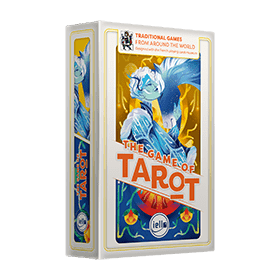法國塔羅牌
 《塔羅牌》是款吃墩卡牌遊戲,原先使用包含 78 張牌的特殊牌組!實際上 21 張牌是王牌,也是暨經典花色後的第五種花色(紅心、方塊、梅花、黑桃)。
《塔羅牌》是款吃墩卡牌遊戲,原先使用包含 78 張牌的特殊牌組!實際上 21 張牌是王牌,也是暨經典花色後的第五種花色(紅心、方塊、梅花、黑桃)。
這個特殊牌組最初用於占卜,於義大利發明後流傳到法國(雖然其他國家有許多變體),再來才發展為牌戲。
本移植版遊戲提供最廣為人知的法國版本,具有叫牌機制。透過收集珍貴卡牌如人頭牌或其他三種稱為「終結牌」的重要卡牌而計分。
玩家人數: 3 - 5
遊戲歷時: 24 mn
複雜度 3 / 5
在線上玩 法國塔羅牌 以及 1223 款其他遊戲。
無需下載──直接用你的網路瀏覽器玩。
與你的朋友以及全世界成千上萬的玩家們。
免費。

在線上玩 法國塔羅牌 以及 1223 款其他遊戲。
無需下載──直接用你的網路瀏覽器玩。
與你的朋友以及全世界成千上萬的玩家們。
免費。

規則摘要
Overview
Each round of Tarot involves two stages: bidding and playing. In the bidding stage, the person who bids the highest becomes the Taker. All the other players are playing collectively against the Taker (except in the five-player version, where the Taker has a secret partner). In the playing stage, the players play tricks until all hands are empty. Cards are worth points. The Taker has to gain a certain number of points to win the round. If the Taker does not succeed, the Taker loses the points they collected and everyone else gains points.
Cards
Ranks (from strongest to weakest): R D C V 10 9 8 7 6 5 4 3 2 1
| Letter | French meaning | American equivalent |
|---|---|---|
| R | Roi | King |
| D | Dame | Queen |
| C | Cavalier | Knight |
| V | Valet | Jack |
Card Types
A Tarot deck has 78 cards.
- 1 "Fool"
- 21 Trump cards
- 56 suited cards (♣, ♥, ♠, ♦)
Special Cards
The 1 of Trump (The Little One) 1★, the 21 of Trump 21★ (The World), and The Fool (The Excuse) are called the Bout or "honor" cards. They are worth the most points and change the target score for victory in a round. The more of these cards the Taker has, the easier it is for them to win.
The Fool has no suit and no rank. It can be played at any point. So use it when you want to avoid giving the Taker a card that would benefit them. If The Fool is played first, the next card determines the lead suit of the trick.
Card points
Each card is worth points. If you win a trick, you get the points of the cards in the trick. You may hover over your cards to see the point value.
- Bout (1★, 21★, Fool): 4 ½ points
- Roi/King: 4 ½ points
- Dame/Queen: 3 ½ points
- Cavalier/Knight: 2 ½ points
- Valet/Jack: 1 ½ points
- All other cards: ½ point
Taker's Goal
The points the Taker needs to get to win the round change depending on the number of Bout cards won.
- All 3 Bouts: 36 points
- 2 Bouts: 41 points
- 1 Bouts: 51 points
- No Bouts: 56 points
Since Bout cards make it easier for the Taker to win, the Taker wants to gain them. The other players want to keep them away from the Taker. The 21★ will never be taken from its owner. The Fool is almost never taken from its owner (it can only be taken if played in the final trick). But the 1★ can easily be taken.
The Deal and Bidding
All cards are dealt to each player except for 6 (in the three- or four-player version) or 3 cards (in the five-player version). These cards are placed face down in a pile called the "Kitty". The Kitty remains hidden until bidding is over. The winner of the bid determines whether the Kitty is revealed and what happens to it.
Counterclockwise from the Dealer, each player either bids or passes. The person who bids the highest becomes the Taker. There are four possible bids:
| Name | Definition | Score Multiplier |
|---|---|---|
| Small | The Kitty is revealed to all players. The Taker integrates it into their hand and discards an equal number of cards. The discarded cards count for the Taker's score. | None |
| Guard | The Kitty is revealed to all players. The Taker integrates it into their hand and discards an equal number of cards. The discarded cards count for the Taker's score. | x2 |
| Guard Without the Kitty | The Kitty remains hidden to all players, but the cards still count for the Taker's score | x4 |
| Guard Against the Kitty | The Kitty remains hidden to all players. The cards are counted in each defender's' score for the round | x6 |
Most variants forbid the Taker from putting any K/R, Trumps, or Bout cards in the Kitty. Some variants allow this if the Taker announces it.
In the five-player version, after the Taker has been determined, but before the Kitty is revealed, the Taker calls out a suit. The person who has the King R of that suit is the Taker's secret partner, making the round 2 versus 3. The partner's identity is not revealed until the called King R is played, allowing the partner to help the Taker in secret. If the King R of that suit is in the Kitty or in the Taker's own hand, the Taker has no partner and the round is 1 versus 4. In the rare case that the Taker has all four Kings R in hand, then when calling a suit, they show them. In this case, the player with the Queen D in that suit becomes the secret partner.
Play
- One must follow suit
- One must play a trump if one cannot follow suit
- If a previous player could not follow suit and played a trump, the other players still have to follow suit if they can.
- If one must play a trump, one must play a higher trump than any trump already played on the trick.
- One must play a lower trump if unable to play a higher one
- If one cannot follow suit nor play a trump, one can play any card
- The Fool can be played on any trick. The person who played the Fool keeps it, not the trick winner UNLESS the Fool is played on the last trick. Then the winner of the trick takes it. This is how the Taker may win all four bouts.
Scoring
All the players' scores should add up to 0 after each round.
In the five-player variant, the Taker's partner shares 1/3 of the Taker's loss.
If the Petit 1★ is played on the last trick, the winner scores 10x the bid.
Bonuses
Poignée
Before playing the first card, a player has the option to declare poignée ("handful"). When you do this, you show your hand to the players and prove you have a certain number of Trumps (depending on number of players). If the declarer wins the trick, they win extra points. But if they don't, they lose the same number of points.
| Name | Players | Trumps | Points |
|---|---|---|---|
| Simple Poignée | 3 | 13 | 20 |
| 4 | 10 | ||
| 5 | 8 | ||
| Double Poignée | 3 | 15 | 30 |
| 4 | 13 | ||
| 5 | 10 | ||
| Double Poignée | 3 | 18 | 40 |
| 4 | 15 | ||
| 5 | 13 |
The Poignée bonus goes to the winner of the trick. It is not counted in the bid's multiplier.
Slam
After dealing the Kitty, the Taker may declare a Slam. That means the Taker intends to win all the tricks. The Taker gets bonus points if they take all tricks and did not declare a Slam.
- 400 points if achieved (not counted in the bid multiplier)
- 200 points if not declared but still achieved
- -200 points if declared but not achieved
One at the End/Petit au Bout
If the Fool is played on the last trick, the winner of the trick gets to either add 10 points to their score (if they are the Taker) or subtract 10 points from the Taker's score.
Misères
If playing with this variant, any player can declare Misère ("misery") before playing their first card.
- Misère of Trumps: If you have no Trump cards and no Fool
- Misère of Honors: If you have no face cards or Bout cards
The declarer gains 10 points for each player. All other players subtract 10 points from their score.
Goulash
If playing with this variant, then during bidding, if everybody passes, then the goal becomes to avoid taking points. The winner of the trick "pays" each opponent the points they took. Petit au bout, Slam, and Poignée cannot be declared. The Fool remains the property of one who plays it. If it is played on the last trick, it wins it. The Kitty is set aside. No one takes it into their hand or counts it in scoring.

